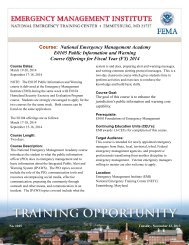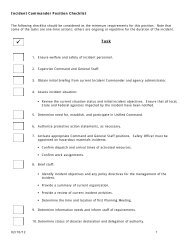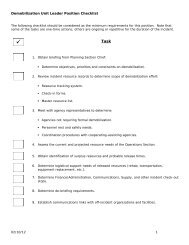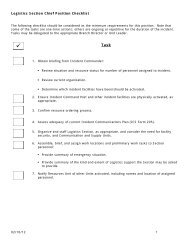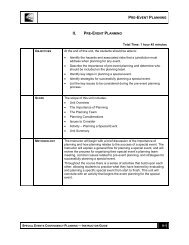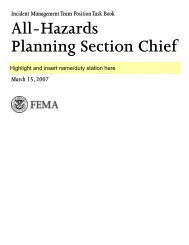Effective Communication - Emergency Management Institute ...
Effective Communication - Emergency Management Institute ...
Effective Communication - Emergency Management Institute ...
You also want an ePaper? Increase the reach of your titles
YUMPU automatically turns print PDFs into web optimized ePapers that Google loves.
UNIT 4: IDENTIFYING COMMUNITY-SPECIFIC COMMUNICATIONS ISSUES<br />
Tips<br />
Tips<br />
How To Recognize When a Message Isn’t Being Communicated<br />
How can you tell when your message is not being communicated? It’s not<br />
realistic to become an expert on every culture that you may encounter.<br />
However, it is reasonable for you to learn about the populations who make up<br />
major parts of your community.<br />
Take the time to learn the basic customs of the ethnic groups in your<br />
community. The tips below may help your learning process.<br />
Many communities sponsor special days on which the various cultures<br />
represented in the community can share their food, artwork, and other<br />
entertainment with their neighbors. Take the time to attend these events.<br />
Pay careful attention to what you see and hear.<br />
Talk to the leaders of the cultural groups in your community. You will find<br />
that most will be pleased that you care enough to make the effort and will be<br />
very willing to share key attributes of their culture with you.<br />
Read news articles about the groups represented in your community.<br />
Frequently, these articles can provide good insight into the people and the<br />
behaviors that are part of their cultures. (This strategy is especially helpful<br />
when you are new to a community or are from a different part of the<br />
country.)<br />
Making yourself aware of key cultural and other differences that you will need to<br />
address during an emergency will help you learn what to expect of the groups<br />
and whether your message is being communicated.<br />
So what do you do “in the moment” to determine whether your message is<br />
being communicated? You might find some of the tips below helpful.<br />
Be sensitive to “puzzled” looks from your audience. Nearly all people of all<br />
cultures show it on their faces when they don’t understand.<br />
Look for changes in body language.<br />
<strong>Effective</strong> <strong>Communication</strong> Page 4.7



